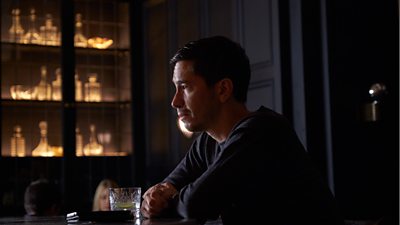Interview with Justin Long
Interview with Justin Long, who plays Vickers in Giri/Haji.

Vickers is like a kid who’s putting on airs, and trying on these adult clothes and they really don’t fit. He’s mimicking powerful people like his father, and trying to approximate their behaviour.
How would you describe Vickers and the role he plays in this story?
He’s a guy who’s in way over his head. He’s so ill-equipped to be succeeding in this world that he finds himself in, having had it forced upon him by his father, whom he just wants to please. I think he’s a really weak, spineless person.
It’s funny how, when he finally decides to assert himself, it ultimately proves disastrous.
Right. It’s like a kid who’s putting on airs, and trying on these adult clothes and they really don’t fit. He’s mimicking powerful people like his father, and trying to approximate their behaviour. That’s such an interesting and fun thing to play.
You have a lot of scenes with Charlie Creed-Miles, who plays London crime boss Abbott. How was it working with him?
Oh man, he was so good. I mean, I know that’s an understatement. He’s just so authentic and fluid in his acting. A lot of actors, you can see them turn on the character and then turn it off, but even in-between takes, Charlie was still inhabiting Abbott. To the point where he made it a lot easier for me, and he was so genuinely intimidating that if you were to push it too much or not rise to the occasion, it would show.
Really great actors like that have a way of exposing bad acting. So it was such a joy to be in the sandbox with him. I just relished doing those scenes, because he felt like that guy, and any doubts I had about being Vickers were totally erased when I got into the scene with him.
It must have felt very different to working with Takehiro Hira and Yôsuke Kubozuka.
They could not have been more different, but they were equally grounded. Both Tak and Yôsuke have such a presence, and are able to convey a deep sense of honour and empathy without doing too much. I’ve never worked with Japanese actors before, so this was my first introduction to that. I love Japan. In fact, I got the job when I was in Japan. I figured, “oh, they must need an American actor who’s already in Tokyo” until they said, “no, all your stuff is in London”. So I actually cut my trip short to do it. I selfishly loved talking to Tak and Yôsuke about Japan, and sharing my love of their country.
What’s at the root of your love for Japan?
Well, it started with food, and then I first went then when I was maybe like 18 or 19. I was promoting a horror movie there, and I just fell in love with how respectful everybody was, the value they placed on respecting one another and the environment. I thought it was beautiful, especially coming from New York where there’s not much of an awareness of societal rules and etiquette. And Tak and Yôsuke were definitely embodiments of that.
Where you ever conscious of the fact that you were the only American in this Japanese-British story?
No, not really. Not as much as I probably should have been, had the crew not been so welcoming. I probably worked to alienate them more than they could have ever hoped to alienate me, because I really love imitating accents - like, people from Yorkshire and Manchester and Leeds and Liverpool. I just couldn’t help but imitate them, sometimes while they’re in front of me. I must have been so obnoxious… but they were all very patient with me, and were so welcoming, and I loved getting to spend time in London. It’s not a huge part, so I had all this time off to go and explore. It was the best job.
What was it like taking part in the huge episode four shoot-out - the Battle of Soho, as Vickers calls it?
I hope it’s the closest I’ll ever come to an actual shoot-out. It felt so real, which was great, because I didn’t have to fake it so much. It was visceral, you could smell the gunpowder, and the sound of the blanks firing was really loud, even with earplugs in. It did take a long time to shoot, though. A lot of long nights, and the weather was cold. To put it diplomatically, it wasn’t as fun as the rest of the shoot. But then I look back and go, oh God, I’m so lucky I got to do that, and I wish I’d appreciated it more. I’m kind of an old baby.
How would you describe Giri/Haji to somebody?
It’s hard for me to describe it without sounding pretentious, but I’m tempted to say there’s something Shakespearean about the tragedy of these two brothers who are trying to find each other. It also reminds me a little bit of post-Tarantino crime movies like Love and a .45, Kalifornia and True Romance, and Magnolia, too, in the way it breaks the fourth wall. I don’t know that I’d just call it a thriller or a drama. It involves so many elements, I don’t know how to sell it or pitch it. I don’t know that I’m equipped to do so!
The Legend Of Giri/Haji
“Let me tell you a story. It
starts with Kenzo Mori. A Tokyo
detective, living a quiet life...
Until his younger brother comes to
him for help. Yuto. The black sheep
of the family. He’d done something
very stupid. But, as it turns out,
not everything can be fixed. Fast
forward a year and Yuto is dead.
Just another Yakuza that met his
end in a hail of bullets. Except
maybe not... Because as Kenzo is
about to find out, the past has a
way of coming back to haunt you.
Rumours start to circle that the
younger Mori brother may be alive
and living in a far-off land. And
soon Kenzo is on a journey to see
for himself. Kenzo and Yuto. A
killer and a saviour. But which is
which? Now, trouble follows Kenzo
everywhere he goes, but so, as it
turns out, does his daughter -
Taki. Sixteen years old. A brave
girl who befriends a lost boy.
Rodney. Half Japanese, half
English. He thinks if he talks loud
enough he won’t be able to hear his
demons. But he doesn’t know yet
just how loud they can scream.
On his way looking for his brother
Kenzo meets Sarah. Another cop
trying to escape something she
can’t outrun. Two people in a city
of eight million and they find each
other. So I suppose this isn’t just
a story about death. It’s a story
about life. And love. And
heartbreak. About the split second
decisions that we make and the
things we lose and win as a result.
It’s a story about gangsters.
(Abbot and Fukuhara)
Killers.
(Donna and Jiro)
Cowards.
(Vickers)
And heroes.
(Rei, Natsuko, Eiko,
Toshio)
It’s about two brothers. Engulfed
in chaos.”
